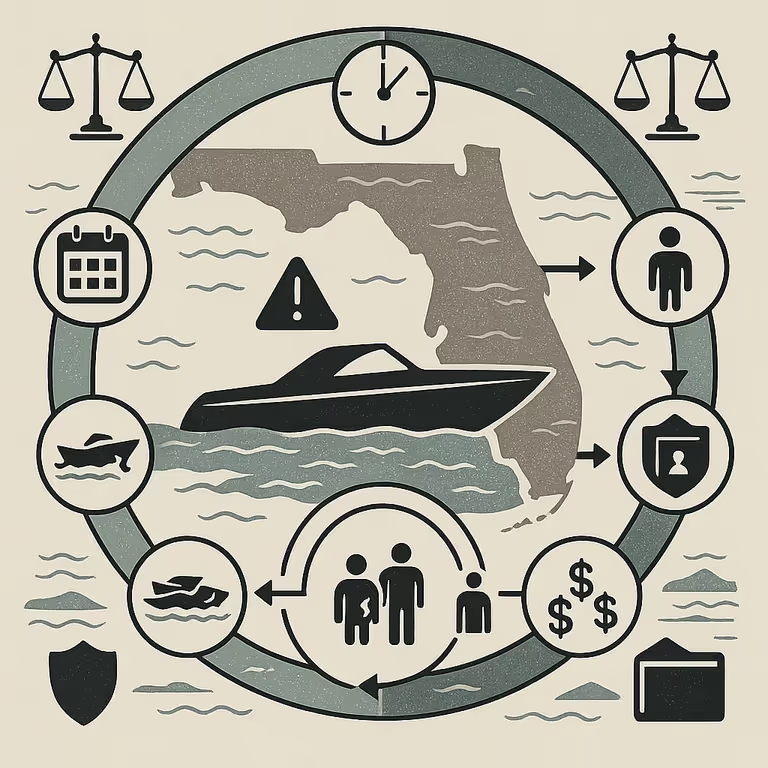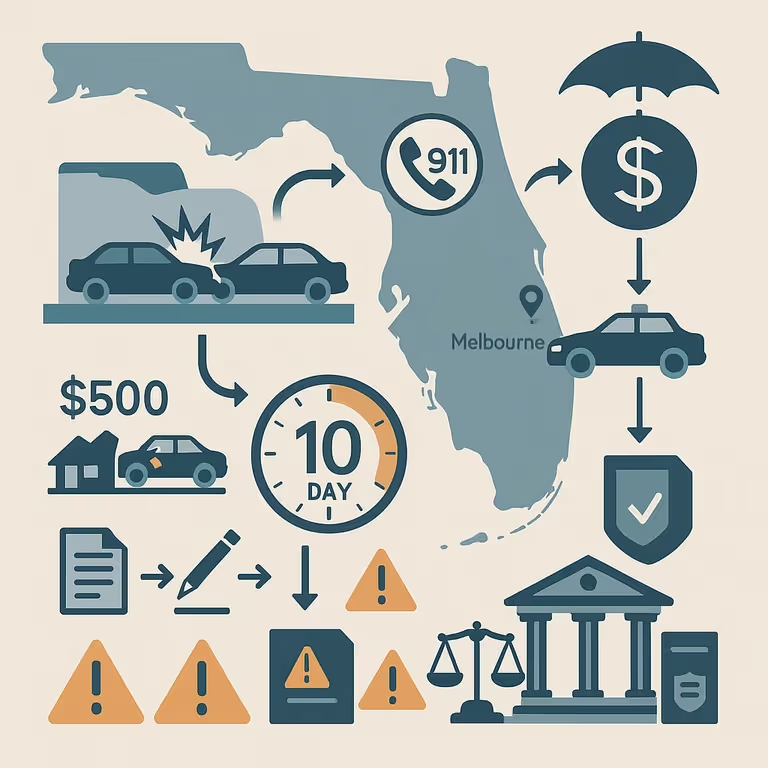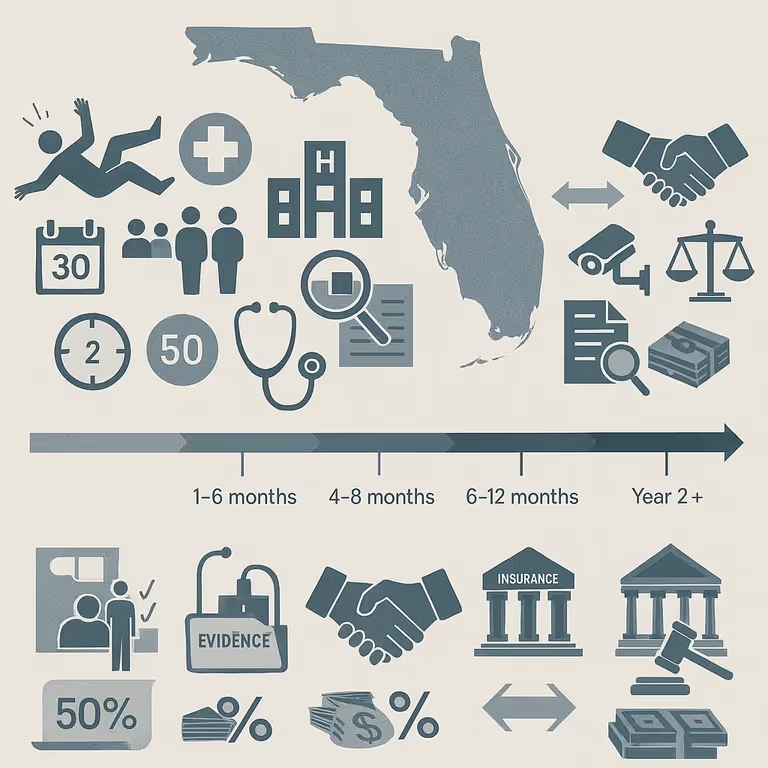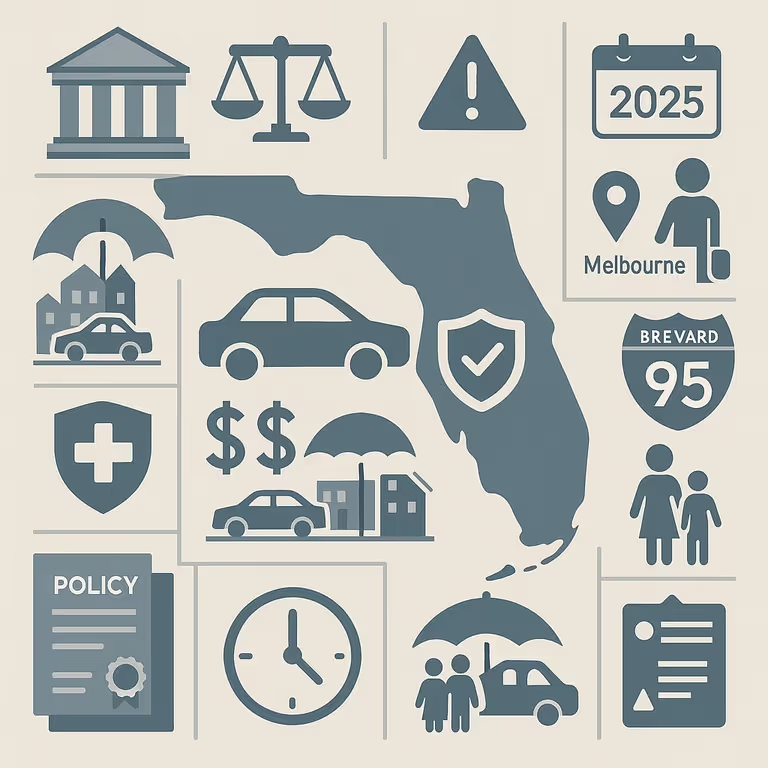Is a Store Liable for a Customer Injury?
Learn when Florida stores are liable for customer injuries, what evidence you need, and how new 2-year deadlines affect your premises liability claim.
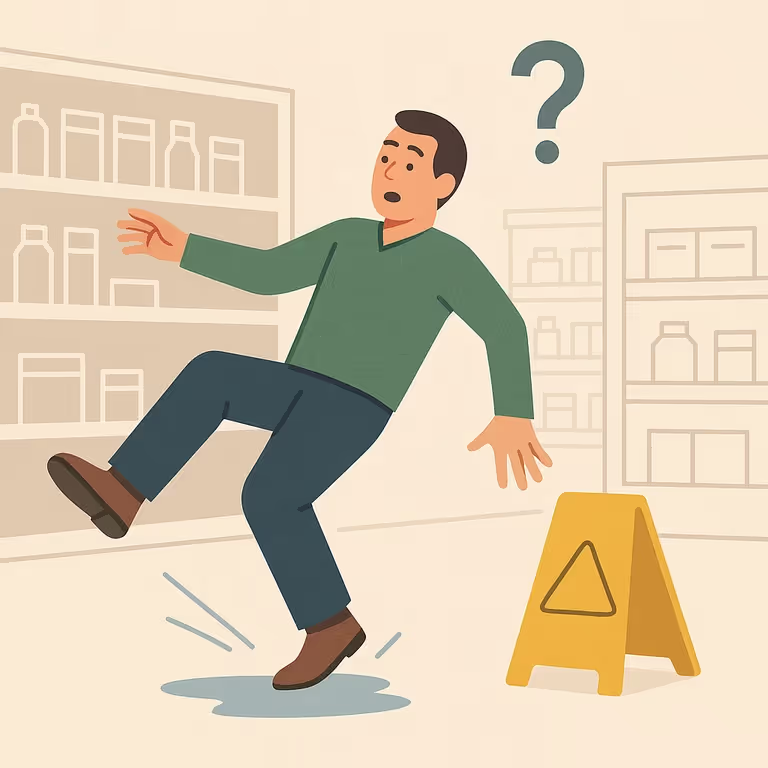
- Florida customers have the highest level of legal protection when injured in stores due to their business invitee status.
- You now have only two years to file a premises liability claim due to 2023 law changes.
- Proper documentation immediately after an accident is essential for preserving evidence and protecting your rights.
Worried About Your Injury Case? We'll Review It - Free!


Your Special Legal Status as a Florida Store Customer
Accidents can happen in everyday places like grocery or department stores. Whether it's slipping on a wet floor that wasn't marked with warning signs or an injury from fallen merchandise from a poorly secured shelf, the question remains: Is the store automatically responsible? The answer depends on several key factors that every Florida resident should understand, especially given recent changes to state law that have shortened the time you have to take legal action.
In Florida, when you enter a store as a customer, you're not just any ordinary visitor. You have special legal status that provides you with the highest level of protection under the law. This status is called being a "business invitee," which means you've entered the property for purposes that benefit the business owner. Unlike social guests or people who might be wandering onto private property, customers are specifically invited onto business premises to spend money, which creates a relationship that comes with significant legal responsibilities for the store owner.
This elevated status means that Florida businesses must provide you with what the law calls the highest "duty of care." In practical terms, this means stores are legally required to conduct regular inspections of their premises, promptly clean up spills and hazards, maintain adequate lighting throughout their property, properly secure merchandise, and ensure that walkways and flooring are in safe condition. They must also provide reasonable warnings about any dangerous conditions they cannot immediately fix.
The level of protection Florida law provides to customers is much greater than what's offered to other types of visitors. For example, people who enter property for their own purposes (called "licensees") receive less protection, and property owners owe virtually no duty of care to trespassers. This distinction is crucial because it establishes that when you're injured while shopping, at restaurants, or conducting other business activities, the law recognizes that you deserve a higher standard of protection.
At Douglas R. Beam P.A., with nearly four decades of experience serving Melbourne and Brevard County residents, we've successfully handled countless premises liability cases, helping customers understand their rights when they've been injured due to business negligence. Our firm has secured over $1 billion in verdicts and settlements, including significant premises liability awards that have ranged from hundreds of thousands to over a million dollars. When you work with Melbourne premises liability lawyers who understand both Florida law and local court procedures, you're positioning yourself for the best possible outcome in your case.

The Four Elements Required to Prove Store Liability
To understand when a store becomes legally responsible for your injury, it's important to know the specific framework that Florida courts use to evaluate these cases. Proving that a store is liable for your injuries requires demonstrating four key elements, and each one must be clearly established for your case to succeed in court.
The first element is duty – establishing that the store owed you a legal obligation to maintain safe conditions. As we discussed, this is automatically established when you're a customer, because business invitees receive the highest duty of care under Florida law. The store has a legal obligation to exercise reasonable care in maintaining their premises in a reasonably safe condition.
The second element is breach – proving that the store failed to meet their legal duty through some form of negligence. This might involve failing to clean up a spill within a reasonable time, not conducting adequate inspections, failing to properly maintain equipment, or not providing adequate warnings about known hazards.
The third element is causation – demonstrating that the store's negligence directly caused your injury. This means showing both that the dangerous condition was the actual cause of your accident and that your injury was a foreseeable result of the store's negligence.
The fourth element is damages – proving that you suffered actual harm that deserves compensation. This includes medical expenses, lost wages, pain and suffering, and other losses directly related to your injury.
Florida has a specific law that applies to slip and fall accidents involving what the legal system calls "transitory foreign substances," essentially anything that shouldn't normally be on the floor like spilled drinks, dropped food, tracked-in water, or other debris. Under Florida Statute 768.0755, if you're injured in a slip and fall involving these types of substances, you must prove that the business either had actual knowledge of the dangerous condition or that the condition existed for such a length of time that the business should have discovered and remedied it through the exercise of ordinary care.
However, this statute is often misunderstood. It doesn't eliminate other duties that businesses owe to their customers. Stores still have general responsibilities to maintain reasonably safe premises, provide adequate lighting, properly secure merchandise, and address other hazardous conditions beyond just spilled substances. The law also recognizes that businesses can have "constructive knowledge" of a dangerous condition. This means, they should have known about it through reasonable inspection and monitoring procedures, even if no employee specifically witnessed the hazard being created.
When evaluating your case, courts will look at factors like how long the hazard existed, whether the store had reasonable inspection procedures in place, whether employees were trained to identify and address hazards promptly, and whether the dangerous condition was in a high-traffic area where it should have been discovered quickly. These considerations are why working with experienced Florida slip and fall accident lawyers who understand both the statutory requirements and broader premises liability principles becomes so important for building a strong case.

Common Types of Store Accidents and Required Evidence
Understanding the most common types of store accidents and the evidence needed to prove your case can help you recognize when you may have valid legal claims and what steps to take to protect your rights. Store accidents take many forms, and each type requires specific evidence to demonstrate the business's negligence.
Slip and fall accidents are among the most frequent premises liability incidents. These typically involve spilled liquids, dropped food items, tracked-in rainwater, recently mopped floors without proper warnings, or substances that accumulate over time like grease in restaurant areas. To prove these cases, crucial evidence includes photographs of the exact location and substance that caused your fall, witness statements from people who saw the accident or the condition that caused it, security camera footage from the store, and documentation of how long the hazard may have existed.
Falling merchandise accidents occur when improperly stacked or secured items fall from shelves, displays, or storage areas. These cases often involve heavy items, defective shelving systems, overcrowded displays, or items placed too high without proper securing mechanisms. Evidence for these cases includes photos of the merchandise display both before and after the incident, store policies regarding merchandise placement and securing procedures, maintenance records for shelving systems, and any witness accounts of how the merchandise was arranged.
Inadequate lighting accidents happen in dimly lit areas where customers cannot see potential hazards like steps, curbs, potholes, or obstacles in walkways. This is particularly relevant in Florida, where many businesses have large parking lots and outdoor areas. These cases require evidence about the lighting conditions at the time of your accident, photos taken during similar conditions, maintenance records for lighting systems, and expert analysis of whether the lighting met reasonable safety standards.
Defective flooring or walkway accidents involve broken tiles, uneven surfaces, loose carpeting, damaged sidewalks, or potholes in parking areas. For these cases, documentation of the exact condition that caused your fall is crucial, along with evidence about how long the dangerous condition existed and whether the store had been notified about it previously.
Inadequate security accidents represent another category entirely, involving situations where customers are injured due to criminal activity that the store should have reasonably prevented. This might include assaults in parking lots with insufficient lighting or security presence, attacks in stores with known security problems, or incidents in areas where previous crimes should have prompted increased security measures. These cases require evidence about the store's security policies. For example: any previous criminal incidents on the property, the adequacy of lighting and security measures, and expert testimony about reasonable security standards.
Florida's tourism-heavy economy creates unique considerations for store accidents. During busy tourist seasons, stores often experience higher traffic volumes that can lead to more spills and hazards, while hurricane and rainy season conditions can create additional slip hazards from tracked-in water. The transient nature of many customers also means that stores may try to argue that out-of-state visitors were unfamiliar with local conditions.
For any premises liability case, time is critical for evidence preservation. Most stores delete security camera footage after 30 to 90 days, witness memories fade quickly, and physical conditions may be repaired before they can be properly documented. This is why consulting with negligent security lawyers in Melbourne or other premises liability specialists immediately after your accident can be crucial for building the strongest possible case.

Critical Steps to Take Immediately After a Store Injury
Taking the right steps immediately after a store injury can make the difference between a successful insurance claim and a denied case. The actions you take in the first few hours and days following your accident will significantly impact your ability to prove your case and recover fair compensation for your injuries.
Step 1: Seek immediate medical attention, even for seemingly minor injuries. Many serious injuries, particularly those involving the head, neck, or back, may not show symptoms immediately due to adrenaline and shock. Having prompt medical documentation creates an important record linking your injuries to the accident and ensures that any developing complications are properly monitored. Even if you feel fine initially, it's wise to be evaluated by a medical professional who can identify potential problems that might not be immediately apparent.
Step 2: Report the accident to store management immediately. Ask to speak with a manager or supervisor, and insist that they create an official incident report. When providing information for the report, stick to the basic facts of what happened. Detail where you were, what you were doing, and how the accident occurred. Avoid speculating about causes or saying anything that might be interpreted as accepting blame. Remember that this report will likely become evidence in your case, so accuracy is crucial.
Step 3: Document the accident scene thoroughly with photographs. Use your smartphone to take multiple pictures from different angles of the exact location where your accident occurred, the substance or condition that caused your fall, any lack of warning signs or barriers, your injuries if visible and appropriate, and the general area surrounding the accident site. In addition, photograph any clothing or shoes you were wearing, as these items may become important evidence later.
Step 4: Identify and collect contact information from witnesses. Anyone who saw your accident or observed the dangerous condition beforehand can provide crucial testimony for your case. Ask witnesses for their names and telephone numbers. Consider asking them to provide a brief written statement about what they observed, while the incident is still fresh in their memory. Independent witnesses who are not employees of the store are particularly valuable.
Step 5: Preserve all receipts, records, and physical evidence. Keep the clothing and shoes you were wearing during the accident and save receipts from your shopping trip to prove you were a legitimate customer. In addition, retain any medical records and bills related to your treatment. Maintain documentation of any work missed due to your injuries. These items help establish the circumstances of your accident and the extent of your damages.
Step 6: Do not sign any documents except necessary medical forms. Insurance companies and store representatives may try to get you to sign statements, settlement offers, or other paperwork soon after your accident. While they may present these as routine forms, any document you sign could potentially limit your rights or be used against you later. It's always best to have legal counsel review any paperwork before you provide a signature.
Additional important considerations include avoiding discussions about fault or blame with store employees or insurance representatives, not posting about your accident on social media platforms where your statements could be taken out of context, and being cautious about recorded statements to insurance companies, which are often designed to elicit statements that can be used to minimize your claim.
Time is particularly critical when it comes to security footage preservation. Most retail establishments automatically delete their surveillance recordings after 30 to 90 days to save storage space. By promptly notifying the store in writing that you intend to preserve the footage as evidence, you may be able to prevent this automatic deletion. However, this notification should ideally be handled by legal counsel who can ensure it meets proper legal standards and includes all necessary technical specifications.

Understanding Florida's New Two-Year Filing Deadline
One of the most critical aspects of pursuing a premises liability claim in Florida is understanding the strict time limits that govern when you can file a lawsuit. Recent changes to Florida law have significantly reduced the amount of time injury victims have to take legal action, making it more important than ever to act quickly if you've been injured in a store accident.
In 2023, Florida dramatically reduced the statute of limitations for personal injury claims, including premises liability cases, from four years to just two years from the date of your injury. This change took effect in March 2023 as part of House Bill 837, a comprehensive tort reform package that affected many areas of personal injury law. The practical impact of this change cannot be overstated. You now have half as much time as before to discover the full extent of your injuries, gather necessary evidence, and file a lawsuit if settlement negotiations are unsuccessful.
The two-year countdown begins on the date of your injury, not when you discover the full extent of your injuries or when you realize the store was negligent. This means that even if your injuries seem minor initially but later develop into serious complications requiring extensive treatment, the clock started ticking from your original accident date. For injuries that may have long-term consequences, such as back injuries, traumatic brain injuries, or complex orthopedic problems, this compressed timeline can create significant challenges for injury victims who need time to understand their prognosis and future medical needs.
This shortened deadline has several important practical implications for store injury victims. Insurance companies are now under less pressure to settle claims quickly, knowing that injury victims have less time to pursue litigation if negotiations fail. Medical treatment and rehabilitation may still be ongoing when legal deadlines approach, making it difficult to fully assess the total value of a claim. The evidence-gathering process, including depositions, expert evaluations, and document discovery, must be accelerated to meet tighter deadlines.
For cases where injuries occurred before March 2023, different rules may apply. If your accident happened before the law change, you may still have up to four years from your injury date to file a lawsuit, depending on the specific timing. However, determining which statute of limitations applies to your case can be complex, and delay in seeking legal counsel could still jeopardize your rights.
The compressed timeline makes early legal consultation more critical than ever. What might have been adequate time under the old law to thoroughly investigate a case, complete medical treatment, and explore settlement options has now been cut in half. Experienced personal injury attorneys must now begin working on cases earlier in the process, often while clients are still receiving medical treatment and before the full extent of injuries has been determined.
This urgency extends to evidence preservation as well. Security footage, which many stores delete after 30-90 days, becomes even more critical to preserve quickly. Witness memories fade over time, and physical conditions at accident scenes may be changed or repaired while victims are still recovering from their injuries. What used to be a manageable timeline for gathering evidence has become much more compressed, requiring immediate action to protect crucial evidence that supports your claim.
The shortened statute of limitations also affects the strategies available to your legal team. Previously, attorneys might have taken time to observe the full progression of a client's injuries before filing suit. Now, they may need to file protective lawsuits earlier in the process to preserve their clients' rights, even if they would prefer to continue settlement negotiations. This can increase litigation costs and create additional complexity in case management.
For Brevard County residents, working with Brevard County personal injury lawyers who understand both the new legal requirements and local court procedures becomes even more important under these tighter timelines. Local attorneys familiar with area judges, court scheduling, and regional insurance practices can more effectively navigate the accelerated process required to meet Florida's new deadlines while still building the strongest possible case for their clients.
Types of Compensation Available for Store Injuries
When you're injured in a store accident, understanding what types of compensation you may be entitled to receive and how to maximize your recovery can make a significant difference in your financial future. Premises liability cases can result in substantial compensation when properly handled, covering not just your immediate expenses but also the long-term impact of your injuries on your life.
Medical expenses represent the most straightforward category of compensation and include all reasonable and necessary medical treatment related to your injury. This encompasses emergency room visits, hospital stays, surgery costs, diagnostic testing like X-rays and MRIs, physical therapy and rehabilitation, prescription medications, and future medical treatment that may be required as a result of your injuries. In cases involving serious injuries, medical expenses alone can reach hundreds of thousands of dollars, particularly when ongoing treatment or multiple surgical procedures are necessary.
Lost wages compensation covers income you've lost due to your inability to work following your accident. This includes wages lost during recovery time, vacation or sick time used for medical appointments, lost bonuses or commissions that would have been earned. Lost wages involve potential future lost earnings if your injuries result in permanent disability or reduced earning capacity. For self-employed individuals or those without traditional employment, proving lost income requires additional documentation but is still recoverable with proper evidence.
Pain and suffering damages acknowledge the physical discomfort, emotional distress, and reduced quality of life you've experienced due to your injuries. While these damages are more subjective than medical bills or lost wages, they often represent the largest component of premises liability settlements. Factors that influence pain and suffering awards include the severity and permanence of your injuries, and the impact on your daily activities and relationships. Additional factors include the level of pain experienced during treatment and recovery, and any psychological effects such as anxiety about returning to stores or public places.
Additional compensation may be available depending on your specific circumstances. This can include transportation costs for medical appointments, expenses for household help needed during recovery. Modifications to your home or vehicle necessitated by permanent disabilities, and loss of consortium claims for spouses affected by changes in your relationship due to the injuries, may also provide additional compensation.
Several factors affect the ultimate value of your compensation. The degree of the store's negligence plays a crucial role. Cases involving obvious safety violations or repeated dangerous conditions typically result in higher awards. The severity and permanence of your injuries significantly impact compensation amounts, with permanent disabilities, scarring, or chronic pain conditions commanding higher settlements. Your age and life expectancy also matter, as younger victims with permanent injuries may receive larger awards due to their extended period of impairment.
The insurance company tactics you'll face are designed to minimize payouts, which is why professional legal representation becomes crucial. Insurance adjusters may contact you quickly after your accident offering small settlement amounts and pressuring you to accept their offer before you understand the full extent of your injuries. They may request recorded statements designed to elicit comments that can be used against you later. Insurance companies may argue that your injuries were pre-existing or caused by other factors unrelated to the store accident.
At Douglas R. Beam P.A., we work on a contingency fee basis for premises liability cases, which means you pay no attorney fees unless we successfully recover compensation for you. This arrangement allows injury victims to access high-quality legal representation without worrying about upfront costs during what is often a financially challenging time. We provide free consultations to evaluate your case and explain your legal options. Our nearly 40 years of experience in Brevard County means we understand how local courts, judges, and insurance companies approach these cases.
Our track record speaks for itself. Our team comes with over $1 billion in verdicts and settlements, including multiple premises liability awards ranging from hundreds of thousands to well over a million dollars. We have the experience and resources necessary to take on even the largest retail corporations and their insurance companies. Our recent successes include significant settlements and verdicts for clients injured in various premises liability scenarios. This demonstrates our ability to secure meaningful compensation for injury victims throughout Central Florida.
If you've been injured in a store anywhere in Melbourne, Brevard County, or Central Florida, contact our Melbourne office today for your free consultation. Don't let Florida's new two-year deadline cost you the compensation you deserve. Call Douglas R. Beam P.A. at (321) 723-6591 to speak with experienced premises liability attorneys who have successfully recovered millions of dollars for injury victims throughout Central Florida.
This article provides general information and is not a substitute for legal advice. Laws can change, and the details of your situation matter. For personalized guidance, please contact a qualified Florida personal injury attorney.
Not Sure What To Do Next? We Can Help – Fast & Free.
Worried About Your Injury Case?
We'll Review It - Free
Don’t miss an article
Florida law, local insights, and the occasional dog pic.
Delivered straight to your inbox.
More articles
Browse all articlesFree Case Review
Get a complimentary review of your case

.webp)
.png)
.png)
.png)

